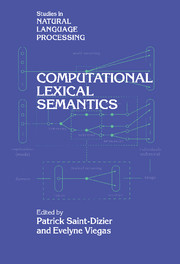Book contents
- Frontmatter
- Contents
- List of contributors
- Preface
- 1 An introduction to lexical semantics from a linguistic and a psycholinguistic perspective
- Part I Psycholinguistics for lexical semantics
- 2 Polysemy and related phenomena from a cognitive linguistic viewpoint
- 3 Mental lexicon and machine lexicon: Which properties are shared by machine and mental word representations? Which are not?
- Part II Foundational issues in lexical semantics
- Part III Lexical databases
- Part IV Lexical semantics and artificial intelligence
- Part V Applications
- Part VI Computer models for lexical semantics
- Author index
- Subject index
2 - Polysemy and related phenomena from a cognitive linguistic viewpoint
Published online by Cambridge University Press: 29 September 2009
- Frontmatter
- Contents
- List of contributors
- Preface
- 1 An introduction to lexical semantics from a linguistic and a psycholinguistic perspective
- Part I Psycholinguistics for lexical semantics
- 2 Polysemy and related phenomena from a cognitive linguistic viewpoint
- 3 Mental lexicon and machine lexicon: Which properties are shared by machine and mental word representations? Which are not?
- Part II Foundational issues in lexical semantics
- Part III Lexical databases
- Part IV Lexical semantics and artificial intelligence
- Part V Applications
- Part VI Computer models for lexical semantics
- Author index
- Subject index
Summary
Introduction
One of the fundamental problems of lexical semantics is the fact that what C. Ruhl (1989) calls the ‘perceived meaning’ of a word can vary so greatly from one context to another. In this chapter I want to survey the ways in which the contribution the same grammatical word makes to the meaning of a larger unit may differ in different contexts. There are two main sources of explanatory hypotheses for contextual variations in word meaning: lexical semantics and pragmatics. While there are probably no contexts where each of these is not involved in some way, their relative contributions can vary. For instance, in the following examples the difference between 1 and 2 in respect of the interpretation of the word teacher (i.e.,“male teacher” and “female teacher”, respectively) can be accounted for entirely by differential contextual enrichment of a single lexical meaning for teacher (in other words, pragmatically):
1. The teacher stroked his beard.
2. Our maths teacher is on maternity leave.
The only involvement of lexical semantics here is that the specification of the meaning of teacher must somehow make it clear that although it is unspecified for sex, it is, unlike, say, chair, specifiable for sex. Examples 3 and 4 exemplify a slightly different type of contextual enrichment, in that the extra specificity in context is of a meronymous rather than a hyponymous type:
3. John washed the car.
4. The mechanic lubricated the car.
The different actions performed on the car allow us to infer that the agents were occupied with different parts of the car in each case.
- Type
- Chapter
- Information
- Computational Lexical Semantics , pp. 33 - 49Publisher: Cambridge University PressPrint publication year: 1995
- 37
- Cited by

